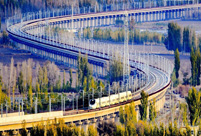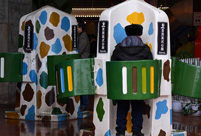

CHENGDU, March 3 -- The world's deepest subterranean lab in southwest China is building another underground space that will block cosmic rays, helping scientists trace the origin of elements.
Jinping Underground Laboratory, which is 2,400 meters deep in a mountain in Sichuan Province, has begun building a nuclear astrophysics lab, the China Institute of Atomic Energy told Xinhua.
This arm of physics is a frontier science that studies nuclear reactions within stars, the process that creates many elements. Research into this area provides insight into stars' evolution and the origins of elements.
"The lab will offer the world a new top-class platform for conducting precise measurement on nuclear astrophysics," said Liu Weiping, vice dean of the institute.
Researchers hope to use the facility to explore the birth of heavy elements by measuring neutron source reactions, according to Liu.
Scientists say cosmic rays are known to have disrupted previous observations. This new lab will provide a "clean" space for a number of physical and cosmologic experiments, including those concerns with the search for "dark matter."
The facility opened in December 2010 and was expanded in 2014.
 China has world's largest high-speed rail network
China has world's largest high-speed rail network Top beauties in Chinese provinces
Top beauties in Chinese provinces 600 people attend Lusheng playing contest in S China
600 people attend Lusheng playing contest in S China Engineer troop builds bridge in real combat conditions
Engineer troop builds bridge in real combat conditions You can urinate in public in Chongqing
You can urinate in public in Chongqing Rice terrace scenery in southwest China's Yunnan
Rice terrace scenery in southwest China's Yunnan 2016 Miss Chinatown USA pageant held in San Francisco
2016 Miss Chinatown USA pageant held in San Francisco Ancient pagodas across China
Ancient pagodas across China Wedding dress show up in the air
Wedding dress show up in the air Top 20 hottest women in the world in 2014
Top 20 hottest women in the world in 2014 Top 10 hardest languages to learn
Top 10 hardest languages to learn 10 Chinese female stars with most beautiful faces
10 Chinese female stars with most beautiful faces China’s Top 10 Unique Bridges, Highways and Roads
China’s Top 10 Unique Bridges, Highways and Roads Foreign investment in SOEs welcome: MOFCOM
Foreign investment in SOEs welcome: MOFCOM China adopts pop songs, rock to instill patriotism in youth
China adopts pop songs, rock to instill patriotism in youth No more ship-grounding tricks allowed in South China Sea
No more ship-grounding tricks allowed in South China Sea What it takes to be a real Beijing expat – according to the old hands themselves
What it takes to be a real Beijing expat – according to the old hands themselvesDay|Week